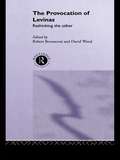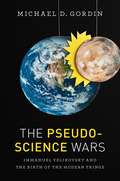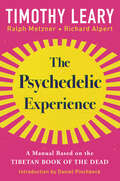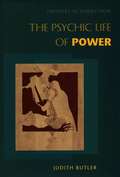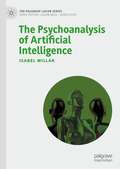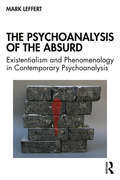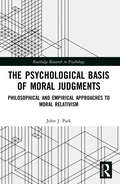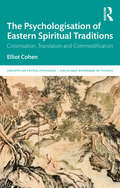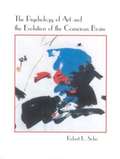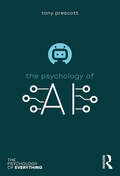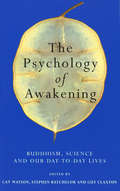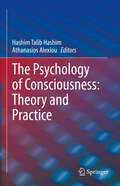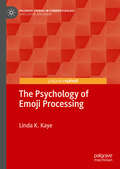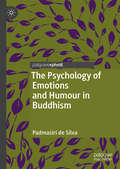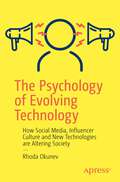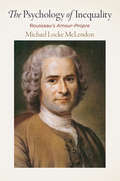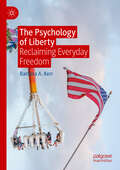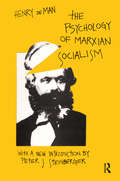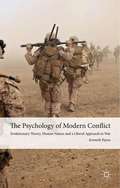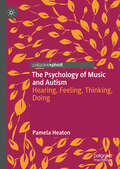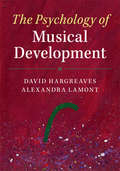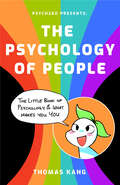- Table View
- List View
The Provocation of Levinas: Rethinking the Other (Warwick Studies in Philosophy and Literature)
by David Wood Robert BernasconiThere is a growing recognition of Levinas's importance. It can in part be attributed to an increasing concern that twentieth-century continental philosophy seems to have no place for ethics. In making ethics fundamental to philosophy, rather than a problem to which we might one day return, Levinas transforms continental thought. The book brings together some of the most interesting and far-reaching responses to the work of Levinas, in three different areas: contemporary feminism, psychotherapy, and Levinas's relation to other philosophers. It includes a newly translated paper by Levinas on suffering, and a specially commissioned interview.
The Pseudoscience Wars: Immanuel Velikovsky and the Birth of the Modern Fringe
by Michael D. GordinProperly analyzed, the collective mythological and religious writings of humanity reveal that around 1500 BC, a comet swept perilously close to Earth, triggering widespread natural disasters and threatening the destruction of all life before settling into solar orbit as Venus, our nearest planetary neighbor. Sound implausible? Well, from 1950 until the late 1970s, a huge number of people begged to differ, as they devoured Immanuel Velikovsky’s major best-seller, Worlds in Collision, insisting that perhaps this polymathic thinker held the key to a new science and a new history. Scientists, on the other hand, assaulted Velikovsky’s book, his followers, and his press mercilessly from the get-go. In The Pseudoscience Wars, Michael D. Gordin resurrects the largely forgotten figure of Velikovsky and uses his strange career and surprisingly influential writings to explore the changing definitions of the line that separates legitimate scientific inquiry from what is deemed bunk, and to show how vital this question remains to us today. Drawing on a wealth of previously unpublished material from Velikovsky’s personal archives, Gordin presents a behind-the-scenes history of the writer’s career, from his initial burst of success through his growing influence on the counterculture, heated public battles with such luminaries as Carl Sagan, and eventual eclipse. Along the way, he offers fascinating glimpses into the histories and effects of other fringe doctrines, including creationism, Lysenkoism, parapsychology, and more—all of which have surprising connections to Velikovsky’s theories. Science today is hardly universally secure, and scientists seem themselves beset by critics, denialists, and those they label “pseudoscientists”—as seen all too clearly in battles over evolution and climate change. The Pseudoscience Wars simultaneously reveals the surprising Cold War roots of our contemporary dilemma and points readers to a different approach to drawing the line between knowledge and nonsense.
The Psychedelic Experience
by Timothy Leary Ralph Metzner Richard AlpertYears after the Summer of Love, the promise of the psychoactive 1960s—that deeper self-awareness and greater harmony can be achieved through reality-bending substances and practices—is close to becoming a mainstream phenomenon. The signs are everywhere, from a renewed interest in the therapeutic effects of LSD to the popularity of ayahuasca trips and the annual spectacle of Burning Man.The Psychedelic Experience, created by the prophetic shaman-professors Timothy Leary, Ralph Metzner, and Richard Alpert (Ram Dass), is a foundational text that serves as a model and a guide for all subsequent mind-expanding inquiries. Based on a unique interpretation of The Tibetan Book of the Dead, The Psychedelic Experience remains a vital testament to broadening spiritual consciousness through a combination of Tibetan meditation techniques and psychotropic substances. For a new generation seeking the trip of a lifetime, The Psychedelic Experience is the essential guidebook to getting there.
The Psychic Life of Power: Theories in Subjection
by Judith ButlerAs a form of power, subjection is paradoxical. <P><P>To be dominated by a power external to oneself is a familiar and agonizing form power takes. To find, however, that what "one" is, one's very formation as a subject, is dependent upon that very power is quite another. <P><P>If, following Foucault, we understand power as forming the subject as well, it provides the very condition of its existence and the trajectory of its desire. <P><P>Power is not simply what we depend on for our existence but that which forms reflexivity as well. Drawing upon Hegel, Nietzsche, Freud, Foucault, and Althusser, this challenging and lucid work offers a theory of subject formation that illuminates as ambivalent the psychic effects of social power.
The Psychoanalysis of Artificial Intelligence (The Palgrave Lacan Series)
by Isabel MillarThis book examines the crucial role of psychoanalysis in understanding what AI means for us as speaking, sexed subjects. Drawing on Lacanian theory and recent clinical developments it explores what philosophy and critical theory of AI has hitherto neglected: enjoyment. Through the reconceptualization of Intelligence, the Artificial Object and the Sexual Abyss the book outlines the Sexbot as a figure who exists on the boundary of psychoanalysis and AI. Through this figure and the medium of film, the author subverts Kant’s three Enlightenment questions and guides readers to transition from asking 'Does it think?' to 'Can it enjoy?' The book will appeal in particular to students and scholars of psychoanalysis, philosophy, film and media studies, critical theory, feminist theory and AI research.
The Psychoanalysis of the Absurd: Existentialism and Phenomenology in Contemporary Psychoanalysis
by Mark LeffertThe Psychoanalysis of the Absurd offers an interdisciplinary study of Existentialism and Phenomenology and their importance to the clinical work of Contemporary Psychotherapy and Psychoanalysis. The concept of Absurdity, developed by Camus, has never been applied to the therapeutic situation or directly contrasted with its antithesis; the search for personal meaning. The book begins with narrative accounts of the historical development of Psychoanalysis, Existentialism and Phenomenology in 20th century Europe. The focus here is on fin de siècle Vienna and Paris between the Wars as the principal incubators of the two disciplines. Accompanied by composite case illustrations, Leffert then explores his own development of the Psychoanalysis of the Absurd, drawing on the work of Camus, Heidegger and Sartre. Absurdity is first discussed in relation to the Bio-Psycho-Social Self and Dasein is posited as a bridge concept, with personal meaning as the antithesis to Absurdity, before being discussed in relation to the world and how it impinges on self. A final chapter attempts to tie together particular issues raised by the book: Subjective well-being, Meaning, thrownness, Absurdity, Death and Death Anxiety and how we have become technologically enhanced human beings. Existential psychotherapy and psychoanalysis have, until now, largely gone their own way: the goal of this book is to fold them back into Contemporary Psychoanalysis. Establishing that the concept of Absurdity is of singular clinical importance to both diagnosis and therapeutic action, this book will be of great interest to clinicians, philosophers, and interdisciplinary scientists.
The Psychological Basis of Moral Judgments: Philosophical and Empirical Approaches to Moral Relativism (Routledge Research in Psychology)
by John J. ParkThis volume examines the psychological basis of moral judgments and asks what theories of concepts apply to moral concepts. By combining philosophical reasoning and empirical insights from the fields of moral psychology, cognitive science, evolutionary psychology, and neuroscience, it considers what mental states not only influence, but also constitute our moral concepts and judgments. On this basis, Park proposes a novel pluralistic theory of moral concepts which includes three different cognitive structures and emotions. Thus, our moral judgments are shown to be a hybrid that express both cognitive and conative states. In part through analysis of new empirical data on moral semantic intuitions, gathered via cross-cultural experimental research, Park reveals that the referents of individuals’ moral judgments and concepts vary across time, contexts, and groups. On this basis, he contends for moral relativism, where moral judgments cannot be universally true across time and location but only relative to groups. This powerfully argued text will be of interest to researchers, academics, and educators with an interest in cognitive science, moral theory, philosophy of psychology, and moral psychology more broadly. Those interested in ethics, applied social psychology, and moral development will also benefit from the volume.
The Psychologisation of Eastern Spiritual Traditions: Colonisation, Translation and Commodification (Concepts for Critical Psychology)
by Elliot CohenThis essential book critically examines the various ways in which Eastern spiritual traditions have been typically stripped of their spiritual roots, content and context, to be more readily assimilated into secular Western frames of Psychology. Beginning with the colonial histories of Empire, the author draws from the 1960s Counterculture and the subsequent romanticising and idealising of the East. Cohen explores how Hindu, Buddhist and Daoist traditions have been gradually transformed into forms of Psychology, Psychotherapy and Self-Help, undergoing processes of ‘modernisation’ and secularisation until their respective cosmologies had been successfully reinterpreted and reimagined. An important component of this psychologisation is the accompanying commodification of Eastern spiritual practices, including the mass-marketing of mindfulness and meditation as part of the burgeoning well-being industry. Also presenting emerging voices of resistance from within Eastern spiritual traditions, the book ends with a chapter on Transpersonal Psychology, showing a path for how to gradually move away from colonisation and towards collaboration. Engaging with the ‘mindfulness movement’ and other practices assimilated by Western culture, this is fascinating reading for students and academics in psychology, philosophy and religious studies, as well as mindfulness practitioners.
The Psychology Of Moral Development: The Nature and Validity of Moral Stages (Essays On Moral Development #Vol. 2)
by Lawerence KohlbergThe Psychology of Moral Development: The Nature and Validity of Moral Stages
The Psychology of Art and the Evolution of the Conscious Brain
by Robert L. SolsoHow did the human brain evolve so that consciousness of art could develop? In The Psychology of Art and the Evolution of the Conscious Brain, Robert Solso describes how a consciousness that evolved for other purposes perceives and creates art.
The Psychology of Artificial Intelligence (The Psychology of Everything)
by Tony PrescottWhat is Artificial Intelligence? How will AI impact society? Is AI more powerful than human intelligence?The Psychology of AI explores all aspects of the psychology–AI relationship, asking how closely AI can resemble humans, and whether this means they could have some form of self-awareness. It considers how AI systems have been modelled on human intelligence and the similarities between brains and computers, along with the current limitations of AI and how these could be overcome in the future. It also looks at how people interact with AI in their everyday lives, exploring some of the ethical and societal risks, such as bias in AI algorithms, and the consequences for our long-term future if AIs do surpass humans in important ways.As AI continues to break new milestones, The Psychology of AI answers key questions about what it really means to be human, and how AI will impact our lives in every way, now and into the future.
The Psychology of Awakening: Buddhism, Science and Our Day-to-Day Lives
by Gay Watson, Stephen Batchelor and Guy ClaxtonThe Buddhist view of the mind - how it works, how it goes wrong, how to put it right - is increasingly being recognised as profound and highly practical by scientists, counsellors and other professionals. In The Psychology of Awakening, this powerful vision of human nature, and its implications for personal and social life, are for the first time brought to a wider audience by some of those most influential in exploring its potential for the way we live today. These include: David Brazier Jon Kabat Zinn Francisco Varela Joy Manne Geshe Thubten Jinpa Mark Epstein Gay Watson Maura Sills Guy Claxton Stephen Batchelor Deeply relevant, accessible and authoritative, The Psychology of Awakening will be of interest to all those who wish to understand the workings of their minds a little better and who are also seeking new ways of mastering the challenges - personal, professional and cultural with which modern life confronts us all.
The Psychology of Beauty
by Ethel D. PufferTHE human being who thrills to the experience of beauty in nature and in art does not forever rest with that experience unquestioned. The day comes when he yearns to pierce the secret of his emotion, to discover what it is, and why, that has so stung him--to defend and to justify his transport to himself and to others. He seeks a reason for the faith that is in him. And so have arisen the speculative theories of the nature of beauty, on the one hand, and the studies of concrete beauty and our feelings about it, on the other.
The Psychology of Consciousness: Theory and Practice
by Athanasios Alexiou Hashim Talib HashimThis book talks about the levels of consciousness and their roles in controlling our life and behaviour. The consciousness has a main role in learning human to behave and to live in all life’s situation and ages. This book clarifies these situations in details and the laws that make this system work properly. It provides many solutions and suggestions to control ourselves and our minds and put them in the right way. This book explains many of our behaviours depending on the psychology and the role of the consciousness in the psychiatry, how to treat diseases and mental disorders and how to improve the mental health as well. This subject is not well discussed and detailed in literature so there is a need to give this topic its role in the psychology and in scientific literature too. This book is targeting the consciousness’ levels and the role of these levels in our life and behaviours, so it divides the roles among them as appropriate and in the right way and then the humans can recognize which part is more important than the other and on what they should focus.
The Psychology of Emoji Processing (Palgrave Studies in Cyberpsychology)
by Linda K. KayeThis book draws together the scientific research on how we process and interpret emoji. Most books on the subject of emoji explain how we use emoji and the functions they serve for the sender, but very do very little to address the receiver’s perspective. Seeking to redress this, this book extracts insights from a range of psychology sub-disciplines to provide a comprehensive review of current research on how we process emoji. The book also includes recommended theoretical frameworks and methodologies to help researchers in this area to strengthen their research, as a way of helping advance the research field on this fascinating topic.
The Psychology of Emotions and Humour in Buddhism
by Padmasiri De SilvaThis book examines the psychological dimensions of emotions and humour in Buddhism. While there is a wealth of material concerning human emotions related to humour and the mindful management of negative emotions, very little has been written on the theory of Buddhist humour. Uniting both Buddhist and Western philosophy, the author draws upon the theory of ‘incongruity humour’, espoused by figures such as Kierkegaard, Kant and Hegel and absorbed into the interpretation of humour by the Buddhist monk and former Western philosopher, Ñāṇavīra Thero. The author makes extensive use of rich primary sources such as the parables used by Ajahn Brahm while interweaving Western theories and philosophies to illuminate this original study of humour and emotion. This pioneering work will be of interest and value to students and scholars of humour, Buddhist traditions and existentialism more widely.
The Psychology of Evolving Technology: How Social Media, Influencer Culture and New Technologies are Altering Society
by Rhoda OkunevTechnological innovations have advanced at an incredible speed since the introduction of the computer that it has altered the fabric of our society. The possession of computers, smart-devices, along with social media, texting and video games, is now an intimate part of the structure of our culture. This book is a framework to start a conversation on how technology is changing our lifestyles and transforming our world. There is now an entire generation that has been using technology through the most delicate developmental time in their lives. This book presents how to look at the cognitive and psychosocial developmental stages and what are the age-appropriate milestones and factsheet of behaviors at different ages. It provides insight into the strength and vulnerable characteristics at each stage and the prevalence of some negative conditions in our society. You will gain a perspective of the encouraging and challenging aspects of computer learning, smart devices, and how to start and keep the conversation going from infancy to adulthood in order to keep and maintain your virtues and ways to circumvent unfavorable consequences. In short, The Psychology of Evolving Technology looks at how cutting-edge and revolutionary high technologies have disrupted our society through its many luxuries and conveniences and how it has altered the outlook of our values, privileges, and expectations. What You'll LearnDetermine what adjustments should be made to regulate new innovations to allow them to succeed See how development stages in a child now interact with technologyReview how social media and influencer culture are changing the way we see ourselves in society Who This Book Is For All readers curious about the effect of technology on individuals, growing children, and the fabric of society
The Psychology of Inequality: Rousseau's "Amour-Propre" (Haney Foundation Series)
by Michael Locke McLendonIn The Psychology of Inequality, Michael Locke McLendon looks to Jean-Jacques Rousseau's thought for insight into the personal and social pathologies that plague commercial and democratic societies. He emphasizes the way Rousseau appropriated and modified the notion of self-love, or amour-propre, found in Augustine and various early modern thinkers. McLendon traces the concept in Rousseau's work and reveals it to be a form of selfish vanity that mimics aspects of Homeric honor culture and, in the modern world, shapes the outlook of the wealthy and powerful as well as the underlying assumptions of meritocratic ideals.According to McLendon, Rousseau's elucidation of amour-propre describes a desire for glory and preeminence that can be dangerously antisocial, as those who believe themselves superior derive pleasure from dominating and even harming those they consider beneath them. Drawing on Rousseau's insights, McLendon asserts that certain forms of inequality, especially those associated with classical aristocracy and modern-day meritocracy, can corrupt the mindsets and personalities of people in socially disruptive ways.The Psychology of Inequality shows how amour-propre can be transformed into the demand for praise, whether or not one displays praiseworthy qualities, and demonstrates the ways in which this pathology continues to play a leading role in the psychology and politics of modern liberal democracies.
The Psychology of Liberty: Reclaiming Everyday Freedom
by Barbara A. KerrThis book introduces a new concept of liberty, based on the idea that being free means being the humans we evolved to be in our first 200,000 years. With perspectives from psychology, anthropology, and sociology, the author shows how throughout history, dominant individuals and status hierarchies have injured our psychological and physical well-being. Readers discover simple behaviors that make humans feel free (like gossiping, playing, making, and storytelling) and are prompted to a compelling reflection threats to this freedom. Psychology of Liberty: Reclaiming Everyday Freedom explores the dynamics of creative families, communities, and societies, showing how they sustain human freedom. The author identifies new pathways to freedom, drawing from examples of resistance to authoritarianism. In this timely and ambitious book, the author combines personal narrative with academic research to make complex ideas accessible.
The Psychology of Marxian Socialism
by Henry de ManThis classic work on the psychology of socialism carries for this edition a slightly refurbished title. By calling it The Psychology of Marxian Socialism, the work is sharply distinguished from an earlier work of the same title (written at a much earlier time) by Gustave LeBon. This book was written in the post-Bolshevik revolutionary era, at the height of the Weimar democracy in Germany; LeBon’s represents a fin de siècle effort, reflecting earlier concerns in socialist theory. De Man’s work derives its strength from a close and hard look at how socialism operated in one country. It is probably one of the greatest such efforts in the post-World War I period.
The Psychology of Modern Conflict
by Kenneth PayneWhat does modern warfare have in common with our human evolution? In this study, Dr Kenneth Payne argues that there is an important relationship between the two – we have evolved to fight, and traditional hunter-gatherer societies were often violent places. But we also evolved to cooperate and to behave altruistically towards others. Both these evolutionary legacies can help explain how and why liberal societies fight. Payne considers the evidence for warfare in hunter gatherer communities, and explores how a process of 'domestication' some 10,000 years ago led to larger groups of more social and culturally sophisticated humans. He then considers how this #65533;ber-sociability is manifest in liberal societies in the modern era, underpinning our sense of empathy and moral values.
The Psychology of Music and Autism: Hearing, Feeling, Thinking, Doing
by Pamela HeatonThis book considers the cognitive, behavioural and socio-emotional aspects of autism in relation to music perception, musical engagement and music production. Musicality is considered from an evolutionary perspective and in relation to psychological models of autism. In drawing together literature on autism and music neuroscience with original case studies from musicians with autism, the book seeks to broaden our understanding of typical and atypical musical experience and sets a new agenda for multi-disciplinary research in this area. It provides a unique resource that will appeal to students and scholars of Autism Spectrum Disorder, neurodevelopmental conditions, music psychology and neuroscience, music therapy, music education and inclusive education; as well as to practitioners and general readers.
The Psychology of Musical Development
by David Hargreaves Alexandra LamontThe Psychology of Musical Development provides an up-to-date and comprehensive account of the latest theory, empirical research and applications in the study of musical development, an important and emerging field of music psychology. After considering how people now engage with music in the digital world, and reviewing current advances in developmental and music psychology, Hargreaves and Lamont compare ten major theoretical approaches in this field - including cognitive stage models and neuroscientific, ecological and social cognitive approaches - and assess how successfully each of these deals with five critical theoretical issues. Individual chapters deal next with cognition, perception and learning; social development; environmental influences on ability, achievement and motivation; identity, personality and lifestyle; affect and emotion; and well-being and health. With an emphasis on practical applications throughout, this book will be essential reading for students and scholars of music psychology, developmental psychology, music education and music therapy.
The Psychology of People: The Little Book of Psychology & What Makes You You
by Thomas KingEasy-to-Understand Human Psychology with Psych2Go!#1 New Release in Medical Experimental Psychology, Humanist Philosophy. and Popular Experimental PsychologyFinally understand why you do things differently from the rest! Psych2go created this guide to connect the history of human psychology with practical mental health therapy tools to help you thrive in your everyday life.Discover things about yourself! With The Psychology of People, learn about the history of human psychology—and apply it to your own life. Understand your innate need to conform, the roots of your social anxiety, how to heal and grow emotionally—and so much more!An empath’s survival guide to psychology. Written by the creators of the popular youtube channel, blog, and website called Psych2go, The Psychology of People is one of the best mental wellness books that gives practical and applicable methods! From the ethics of experimental psychology to therapy techniques, The Psychology of People helps you develop empathy for yourself and others. Inside, you’ll find:Your very own, therapist on the go, packed with practical methods and experimentsHow to understand and rewire your brain by discovering psychological-based patterns in yourself and othersOne of the best books about psychology, the history of psychology, and the ethics of experimental science If you're looking for psychology books to read, mental wellness books, or books on human psychology, then grab your copy today! If you liked Collective Illusions, Read People Like a Book, or You Can Do All Things, you’ll definitely love The Psychology of People.
The Psychology of Personhood
by Jack Martin Mark H. BickhardWhat is a person? Surprisingly little attention is given to this question in psychology. For much of the past century, psychology has tended to focus on the systematic study of processes rather than on the persons who enact and embody them. In contrast to the reductionist picture of much mainstream theorising, which construes persons as their mental lives, behaviours or neurophysiological particulars, The Psychology of Personhood presents persons as irreducibly embodied and socially situated beings. Placing the study of persons at the centre of psychology, this book presents novel insights on the typical, everyday actions and experiences of persons in relation to each other and to the broader society and culture. Leading scholars from diverse academic disciplines paint an integrative portrait of the psychological person within evolutionary, historical, cultural, developmental and everyday contexts.
